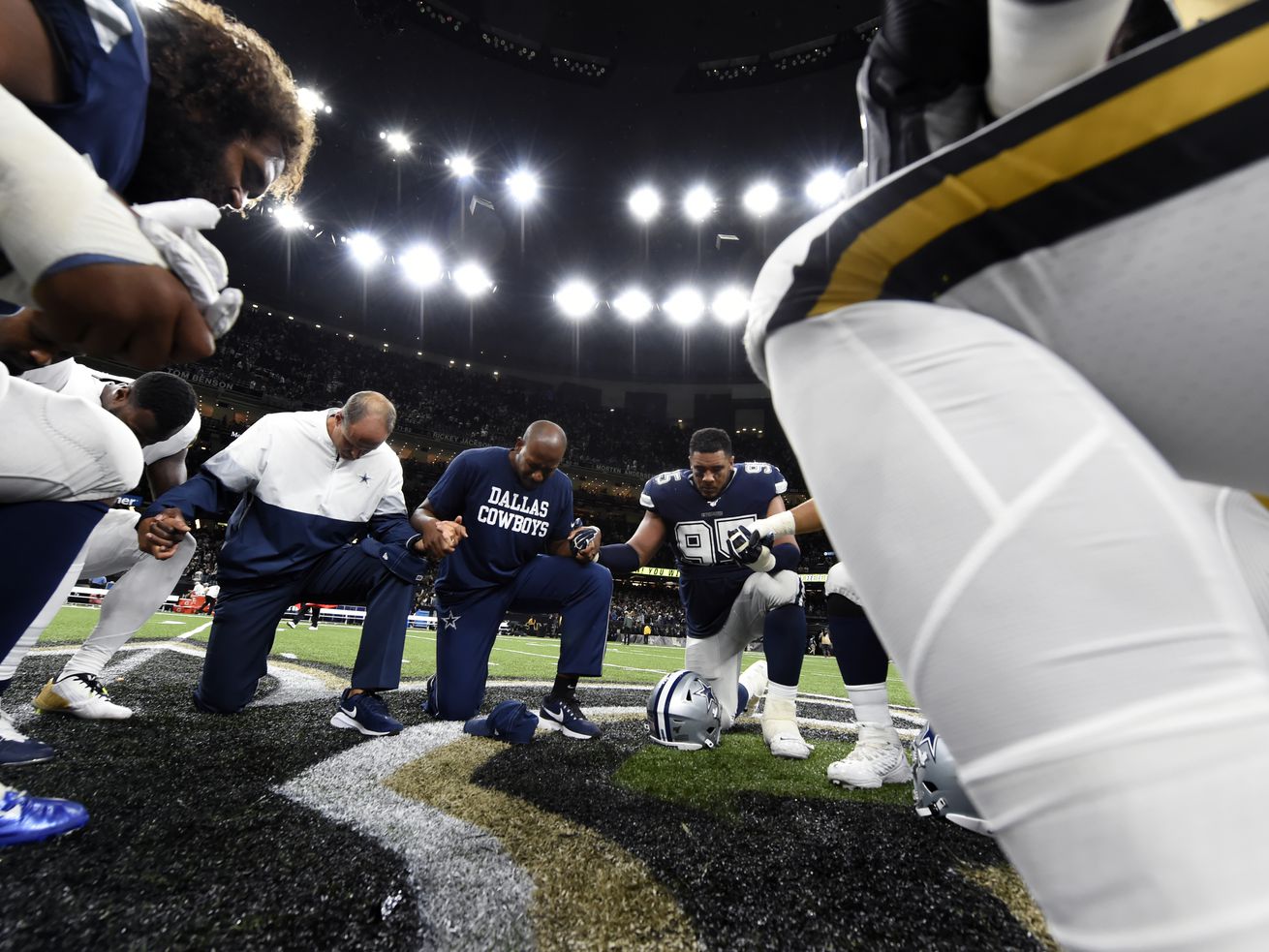
What I learned from listening to the Pray app’s new series of NFL team prayers
This article was first published in the State of Faith newsletter. Sign up to receive the newsletter in your inbox each Monday night.
I wasn’t expecting to be impressed when I cued up the Pray app’s new series of NFL prayers. I figured the brief recordings would be filled with sports clichés and team-related puns, and that I’d spend more time rolling my eyes than thinking about religion.
To a certain extent, my instincts were right. The Rev. Jeff T. Osborne, who put together the team prayers, squeezed a lot of silly wordplay into the one- and two-minute reflections.
“Like the great falcon never drops its prey, God, we are thankful that you never drop us,” he said in his message for fans of the Atlanta Falcons.
“This isn’t about luck,” noted the Rev. Osborne in the Indianapolis Colts prayer in what felt like a clear (and clever) reference to the team’s recently retired quarterback, Andrew Luck.
The prayer for the Buffalo Bills referenced the stadium’s famous tailgate culture. The one for my team, the Green Bay Packers, included an unusually long ode to the beauty of Lambeau Field. Several of the messages highlighted the specific number of fans that would be at home games.
Despite these idiosyncrasies, I found myself oddly touched by the Rev. Osborne’s work, which I listened to on a whim after stumbling on a related press release.
The 32 prayers — one for each NFL franchise — were overflowing with both confidence and gratitude. They weren’t for people afraid of losing or performing poorly; they were for people worried about not appreciating the beauty of the game enough.
As a fan, I definitely fall into the former camp. I get so nervous during big games that I’ve been known to actually leave the room — or even the house — when my team is on the verge of falling apart.
Because of this tendency, the return of the NFL each fall is both a blessing and a curse. I get so excited to spend the weekend watching games, but I also dread the particular pain of a dropped pass, an interception or a 38-3 Packers loss to the New Orleans Saints.
In other words, if I wrote a series of NFL prayers, the reflections would include sentiments like “Please, if we must lose, let it not be embarrassing,” or “God, please let the refs keep their flags in their pockets.”
Thankfully, the Rev. Osborne and the Pray app team was in charge instead of me, and they kept things joyful and inspiring. The 32 prayers focus on something I’ve always loved about football and other team sports: the idea that no one can succeed in isolation, that each individual player needs his teammates, his coaches, his loved ones, the fans and, yes, maybe even God, too.
Fresh off the press
- What you need to know about religious exemptions to vaccine mandates
- Why these faith leaders want Congress to act now on LGBTQ rights
Term of the week: Latin Mass
Latin Mass is a self-explanatory term. It refers to a Catholic worship service conducted mostly in Latin as opposed to in the language predominantly spoken by the community hosting the Mass.
Before church reform in the 1960s and 1970s, Latin Masses were the norm. After, they became a source of contention, and many of the Catholics who wanted the option to continue attending Latin Mass were branded as troublemakers.
Earlier this year, Pope Francis restored formal restrictions on Latin Masses that had been repealed by his predecessor. He justified that move by pointing to persistent conflict surrounding the Masses and highlighting the importance of church unity.
Unsurprisingly, his decision only served to inflame the debates and, as recently as this past weekend, I saw Catholics arguing on Twitter about whether Latin Mass deserves a place in the Catholic tradition.
What I’m reading ...
In his latest column for The Atlantic, scholar Arthur C. Brooks argues that believing in soul mates is a bad idea. It’s better for people to recognize that cultivating and sustaining true love and a healthy marriage takes hard work. “Romantic love is very much like any other important pursuit: Success comes from our ongoing effort; satisfaction from a job well done,” he writes.
JSTOR Daily, which aims to make scholarly research more approachable for regular people, recently published an analysis on the growing popularity of homeschooling. It notes that legal battles involving religious freedom claims helped paved the way for the education laws we have today.
Odds and ends
This Wednesday, Sept. 15, I’ll be participating in a Twitter Town Hall with the Inclusive America Project at 1 p.m. EDT. The event will focus on how to heal the Christian-Muslim divide. Please consider joining in!
Speaking of Twitter, I published a thread last week about the Supreme Court agreeing to hear a challenge to a Texas policy affecting when death row inmates have access to their religious leaders.
